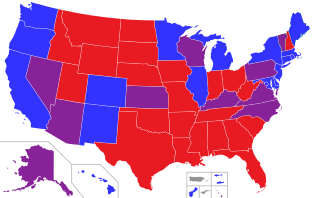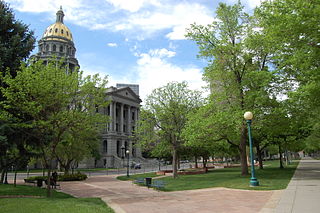
In the United States, the state legislature is the legislative branch in each of the 50 U.S. states.

The governor of Oklahoma is the head of government of the U.S. state of Oklahoma. Under the Oklahoma Constitution, the governor serves as the head of the Oklahoma executive branch, of the government of Oklahoma. The governor is the ex officio commander-in-chief of the Oklahoma National Guard when not called into federal use. Despite being an executive branch official, the governor also holds legislative and judicial powers. The governor's responsibilities include making yearly "State of the State" addresses to the Oklahoma Legislature, submitting the annual state budget, ensuring that state laws are enforced, and that the peace is preserved. The governor's term is four years in length.

The Maryland General Assembly is the state legislature of the U.S. state of Maryland that convenes within the State House in Annapolis. It is a bicameral body: the upper chamber, the Maryland Senate, has 47 representatives, and the lower chamber, the Maryland House of Delegates, has 141 representatives. Members of both houses serve four-year terms. Each house elects its own officers, judges the qualifications and election of its own members, establishes rules for the conduct of its business, and may punish or expel its own members.

The Colorado General Assembly is the state legislature of the State of Colorado. It is a bicameral legislature consisting of the Senate and House of Representatives that was created by the 1876 state constitution. Its statutes are codified in the Colorado Revised Statutes (C.R.S.). The session laws are published in the Session Laws of Colorado.

The North Carolina General Assembly is the bicameral legislature of the state government of North Carolina. The legislature consists of two chambers: the Senate and the House of Representatives. The General Assembly meets in the North Carolina State Legislative Building in Raleigh.

The Texas Legislature is the state legislature of the U.S. state of Texas. It is a bicameral body composed of a 31-member Senate and a 150-member House of Representatives. The state legislature meets at the Capitol in Austin. It is a powerful arm of the Texas government not only because of its power of the purse to control and direct the activities of state government and the strong constitutional connections between it and the Lieutenant Governor of Texas, but also due to Texas's plural executive.

The Florida Legislature is the legislature of the U.S. state of Florida. It is organized as a bicameral body composed of an upper chamber, the Senate, and a lower chamber, the House of Representatives. Article III, Section 1 of the Florida Constitution, adopted in 1968, defines the role of the legislature and how it is to be constituted. The legislature is composed of 160 state legislators. The primary purpose of the legislature is to enact new laws and amend or repeal existing laws. It meets in the Florida State Capitol building in Tallahassee.

The Colorado State Senate is the upper house of the Colorado General Assembly, the state legislature of the US state of Colorado. It is composed of 35 members elected from single-member districts, with each district having a population of about 123,000 as of the 2000 census. Senators are elected to four-year terms, and are limited to two consecutive terms in office. Senators who are term-limited become eligible to run again after a one-term respite.
In public policy, a sunset provision or sunset clause is a measure within a statute, regulation or other law that provides for the law to cease to be effective after a specified date, unless further legislative action is taken to extend it. Unlike most laws that remain in force indefinitely unless they are amended or repealed, sunset provisions have a specified expiration date. Desuetude renders a law invalid after long non-use.

The Tennessee General Assembly (TNGA) is the state legislature of the U.S. state of Tennessee. It is a part-time bicameral legislature consisting of a Senate and a House of Representatives. The Speaker of the Senate carries the additional title and office of Lieutenant Governor of Tennessee. In addition to passing a budget for state government plus other legislation, the General Assembly appoints three state officers specified by the state constitution. It is also the initiating body in any process to amend the state's constitution.

The Maryland Senate, sometimes referred to as the Maryland State Senate, is the upper house of the General Assembly, the state legislature of the U.S. state of Maryland. Composed of 47 senators elected from an equal number of constituent single-member districts, the Senate is responsible, along with the Maryland House of Delegates, for passage of laws in Maryland, and for confirming executive appointments made by the Governor of Maryland.

The Texas Alcoholic Beverage Commission, or TABC, is a Texas public agency responsible for regulating, inspecting, and taxing the production, sale, and use of alcoholic beverages within the state. The agency was established in 1935 and is headquartered in Austin.

The Legislature of the State of Oklahoma is the state legislative branch of the U.S. state of Oklahoma. The Oklahoma House of Representatives and Oklahoma Senate are the two houses that make up the bicameral state legislature. There are 101 state representatives, each serving a two-year term, and 48 state senators, who serve four-year terms that are staggered so only half of the Oklahoma Senate districts are eligible in each election cycle. Legislators are elected directly by the people from single member districts of equal population. The Oklahoma Legislature meets annually in the Oklahoma State Capitol in Oklahoma City.

The Utah State Legislature is the state legislature of the U.S. state of Utah. It is a bicameral body, comprising the Utah House of Representatives, with 75 state representatives, and the Utah Senate, with 29 state senators. There are no term limits for either chamber.

Bill Wayne Clayton, sometimes known as Billy Clayton, was an American politician from West Texas who served as a state legislator for twenty years and was Speaker of the Texas House of Representatives from 1975 to 1983, a tenure twice as long as that of any other presiding officer of the house elected before him. A Conservative Democrat from a rural area of the Texas South Plains, Clayton attained the speakership by successfully forging a broad-based House coalition. He was considered one of the most influential legislators - and, after he left the chamber, lobbyists - in modern Texas history.

The state government of Georgia is the U.S. state governmental body established by the Georgia State Constitution. It is a republican form of government with three branches: the legislature, executive, and judiciary. Through a system of separation of powers or "checks and balances", each of these branches has some authority to act on its own, some authority to regulate the other two branches, and has some of its own authority, in turn, regulated by the other branches. The seat of government for Georgia is located in Atlanta.
The Texas Commission on Law Enforcement or TCOLE, serves as the regulatory agency for all peace officers in Texas, which includes sheriffs and their deputies, constables and their deputies, police officers, marshals, troopers, Texas Rangers, enforcement agents of the Alcoholic Beverage Commission, investigators of the Attorney General, and game wardens. County jailers and public security officers are also regulated by TCOLE.
The Texas Association of Licensed Investigators (TALI) is a professional association of private investigators in the U.S. state of Texas. It ensures adherence to licensing requirements for investigators; organizes training and education; and represents the profession to the state and federal government and regulatory bodies, including the Texas Private Security Board and the Texas Department of Public Safety. TALI holds an annual convention and publishes a magazine, The Texas Investigator.
The Commission on the Reform of Oklahoma State Government, also known as the Nigh Commission, was a committee that in 1984 recommended sweeping changes to the government of the State of Oklahoma to improve efficiency, economy and service. It is named after former Governor of Oklahoma George Nigh, who appointed the Commission.

Legislative staffers in Colorado are employees of the state tasked with supporting the function of the Colorado General Assembly and the members who comprise that body. With very few exceptions, these personnel are non-partisan public servants. Colorado employs a total of 345 legislative staff across various functions.















